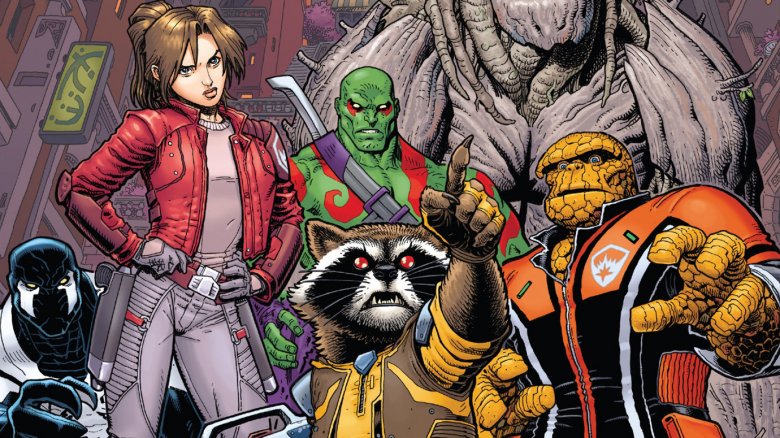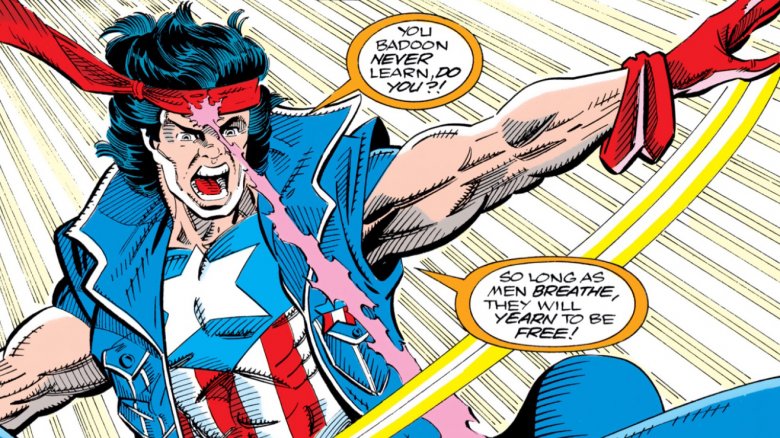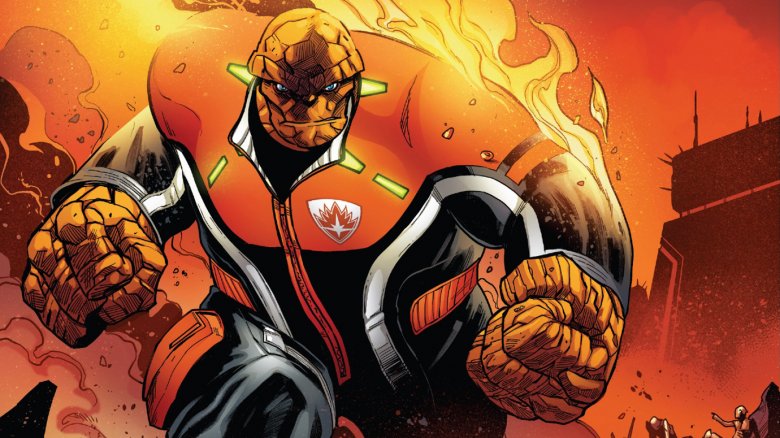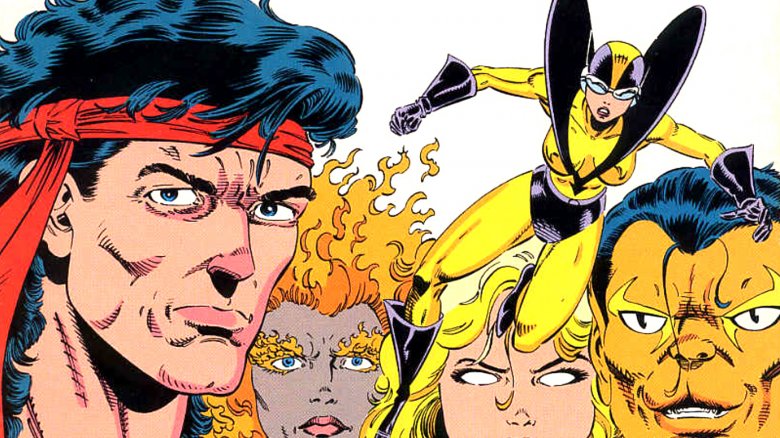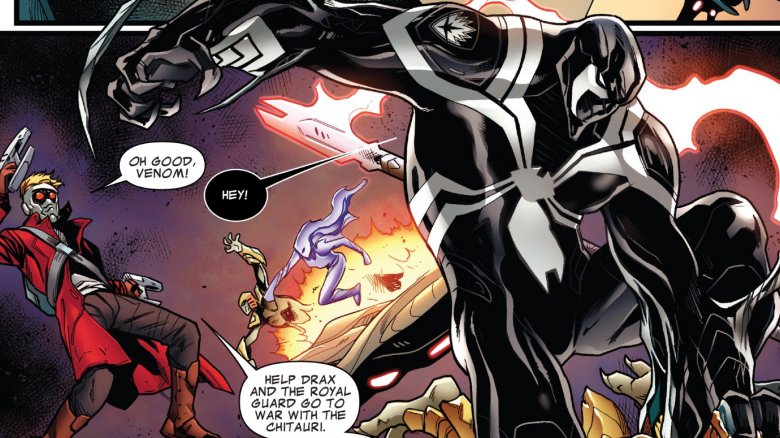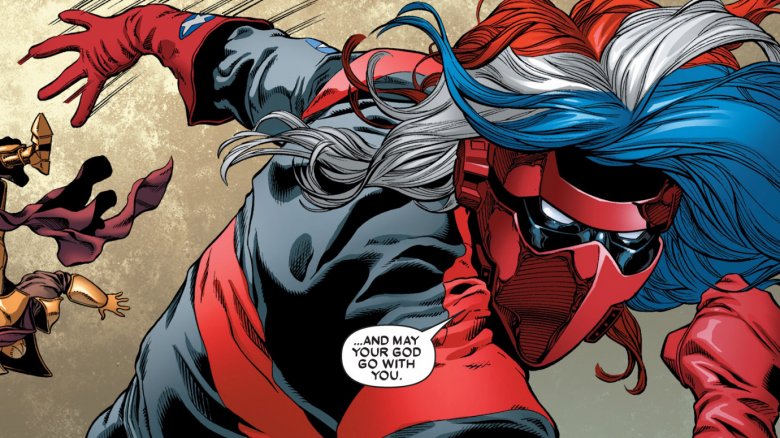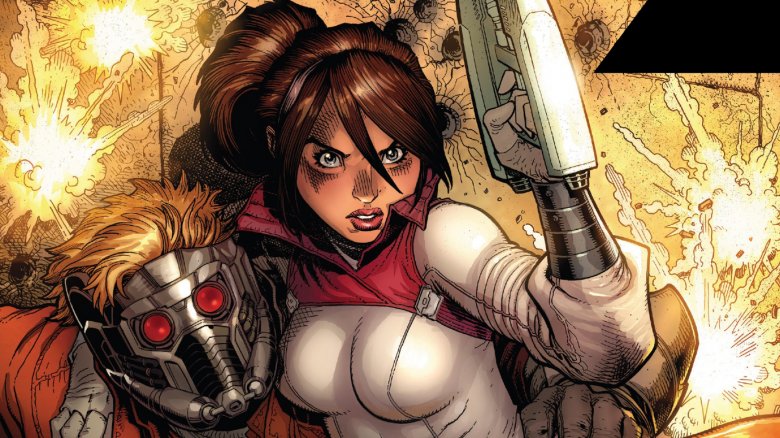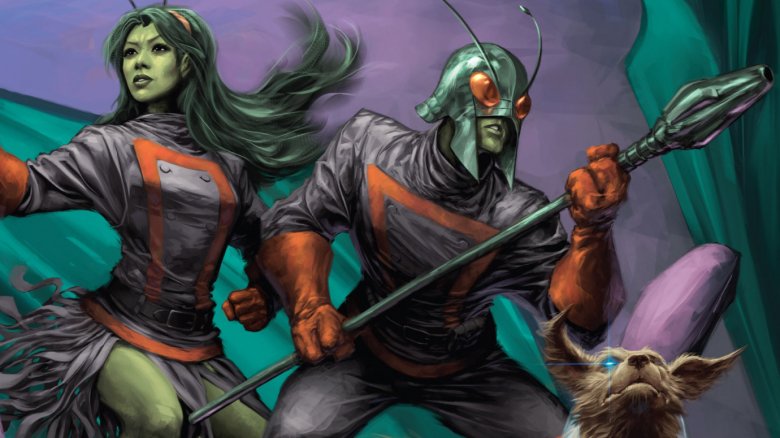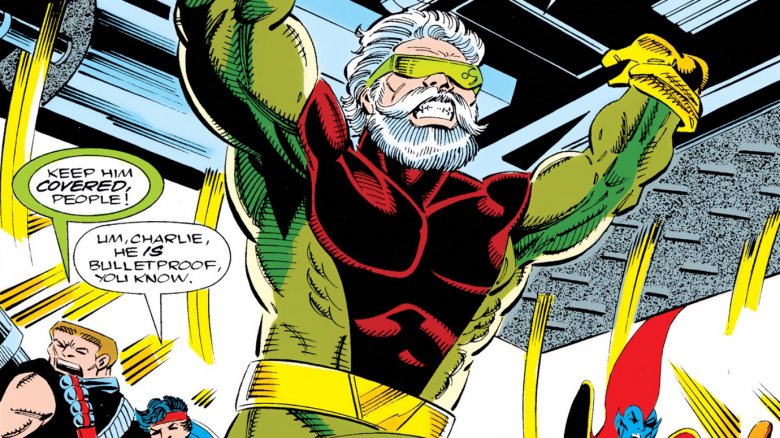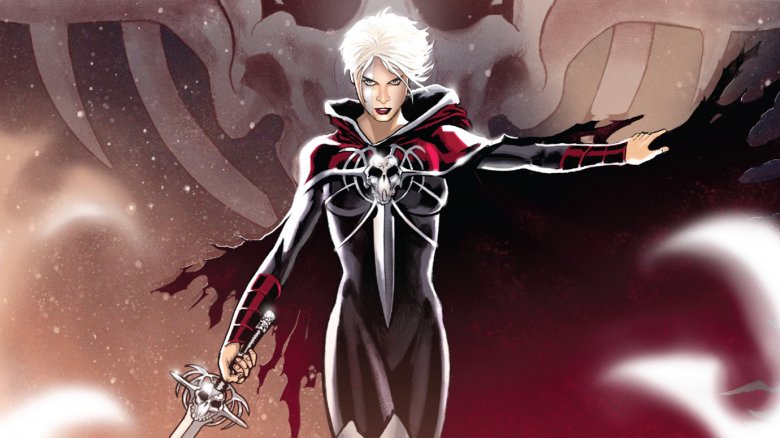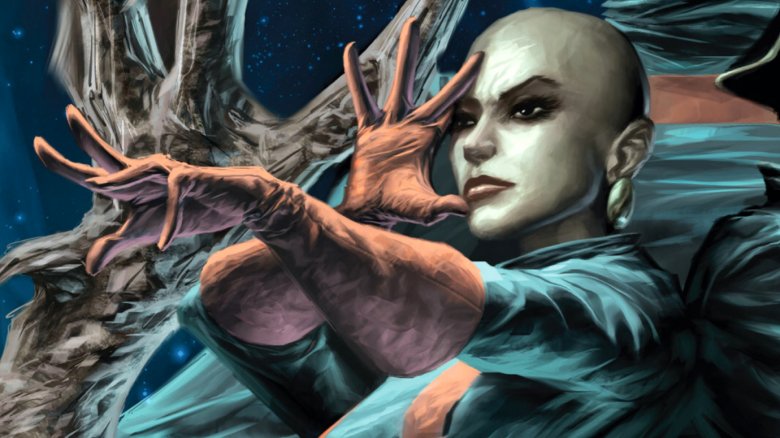Guardians Of The Galaxy Characters We'll Sadly Never See On The Big Screen
Those cameos in Guardians of the Galaxy Vol. 2 were really something, right? We won't give away all the surprises here, but there were characters from the Guardians comics in that movie nobody ever expected to see on a big screen. And not just from the current comcis version, but the original team as well—even though that team lived in the Marvel Universe's 31st Century. (On the other hand, the futuristic version of the team that originally featured Yondu Udonta, who plays a major role in both movies, so appearances by his teammates really shouldn't be all that surprising.)
But even in the wake of those cameos, there are characters from the comics that we're unlikely to ever see in a Guardians movie, no matter how many volumes Marvel Studios might make. Here's a look at the Guardians of the Galaxy who won't be joining the movie team anytime soon.
Vance Astro
Vance Astro, who sometimes goes by the more superheroic name Major Victory, is the only one of the founding Guardians who hasn't already appeared onscreen. He was introduced by Arnold Drake and Gene Colon in Marvel Super-Heroes #18, alongside Yondu, Martinex, and Charlie-27. Although that team was active in the 31st Century, Vance was born in the 20th. He'd been an early interstellar explorer, and spent a thousand years in suspended animation out in deep space. Consequently, he was trapped in a containment suit that kept his preserved body from aging into dust. He became the inheritor of Captain America's shield, and even wore a variation of Cap's uniform when he was temporarily freed from his preservation suit.
With the movie Guardians, including the originals, all active in the 21st Century, nothing about Vance's origin makes sense. He can't be a thousand years old, because that would make him a space traveler from Medieval times, and he can't be the inheritor of Captain America, because Cap's still active down on Earth. With all that in mind, the number one reason not to expect Vance Astro in a future movie is that he hasn't appeared already. Despite all the effort put into fitting Yondu's original team into Vol. 2, they decided to leave out Vance, who would have been an easier visual than some characters who did show up. If writer-director James Gunn and company were interested in adapting Major Victory to the screen, that's where you'd have seen him.
The Thing
Yes, Ben Grimm, the ever-lovin' blue-eyed Thing, has been a member of the Guardians of the Galaxy—quite recently, in fact. The events of 2015's Secret Wars disbanded the Fantastic Four, with Reed and Sue Richards choosing to remain outside the current Marvel Universe as they help rebuild it. That left the Thing and the Human Torch without a team. The Torch allied himself with the Inhumans, while the Thing went to space in Guardians of the Galaxy Vol. 4 #1. It makes sense if you think about it: Grimm started out as a space pilot with ambitions to explore the cosmos—that's how he and his friends ended up bombarded by cosmic rays in the first place.
But as much fun as it was having the Thing in the Guardians comic, he simply can't appear in the movies anytime soon, because the rights to the Fantastic Four and all its core characters are held by Fox Studios, who still haven't given up on the idea that they might figure out how to make a good Fantastic Four movie one day. That makes Ben off-limits to Marvel Studios, which robs us all of the chance to see him arm-wrestling Drax.
Yellowjacket
Rita DeMara was a criminal who stole a Yellowjacket suit, and the name that went with it, from Hank Pym. She was briefly a member of the Masters of Evil, but she just wasn't a bad enough person to fit in with the likes of Baron Zemo and Mr. Hyde. When the 31st Century Guardians fought the Masters of Evil in Guardians of the Galaxy Vol. 1 #29, she switched sides and aided the Guardians, then stowed away when they returned to the future. In issue #34, she officially became a Guardian after saving Charlie-27's life.
While Yellowjacket was a Guardian for quite a few issues, her tenure falls into the second half of that 1990s run, which isn't remembered as fondly as the earlier issues. Also, Ant-Man introduced a very different Yellowjacket to the MCU. And although it's theoretically possible that a young female thief could steal that suit in time for Guardians of the Galaxy Vol. 3, it seems pretty unlikely.
Venom
Yes, this is the same Venom from Spider-Man 3, except that it's also not. It's the same symbiotic alien suit with a mind of its own, but it's not Eddie Brock underneath it. This Venom is Flash Thompson, a guy best known for bullying Peter Parker in high school. As an adult he joined the Army, lost his legs in Iraq, and accepted a mission as the new host for the Venom symbiote, which would allow him to walk again and become a superhero. He took to the stars in Guardians of the Galaxy Vol. 3 #14, serving as an envoy to that team from the Avengers.
Venom was always a strange fit for the Guardians, even in the comics. And since they're Spider-Man characters, the film rights to both Flash Thompson and Venom belong to Sony Pictures, not Marvel. Of course Marvel worked out a deal to put Spider-Man in the Avengers, but putting Venom in the Guardians of the Galaxy just doesn't have the same appeal. On top of that, Peter Parker is still in high school in the MCU, which would mean Flash Thompson is a teenager too, a long way from become the war-weary disabled veteran who would choose to be the host for Venom.
Jack Flag
Jack Flag was a very minor Captain America sidekick from the '90s, most notable for having red, white, and blue hair. He was branded a criminal for using his super-strength to help people during the dark days of Marvel's Civil War, and sent to a prison in the Negative Zone. He escaped from that prison in Guardians of the Galaxy Vol. 2 #10, and opted to remain in outer space rather than return to Earth as a fugitive. He soon joined the team, accompanying them on a number of adventures, and continued to be known primarily as the guy with red, white, and blue hair.
Flag was in several good Guardians stories, but he was never a very memorable character, and his time as a Guardian has been largely forgotten. But the number one reason he's unlikely to join the movie team also applies to Vance Astro, Yellowjacket, and several other characters on this list. James Gunn and the writers of the Guardians films are very committed to keeping Peter Quill as the only Earthling living out in deep space. When Star-Lord mentions Pac-Man, nobody else is supposed to know what he's talking about. This makes sense for storytelling reasons—it cements his status as a fish out of water and it keeps the MCU Earth from seeming as unlike our own as it would if interstellar travel were commonplace.
That's why characters who originally had Earthly origins, such as Drax and Mantis, have been reinvented as fully alien. But you couldn't do that to someone like Jack Flag, whose love of his country and admiration for Steve Rogers are defining characteristics. Jack can only ever be from the same world as Peter Quill, and that alone is enough to keep him out of the movies.
Kitty Pryde
Kitty Pryde is another Earthling, of course, but more importantly she's also an X-Man. She became romantically involved with Peter Quill after they met in All-New X-Men #22, and she replaced him in the Star-Lord role as of Guardians of the Galaxy Vol. 4 #1, after he'd become the ruler of the planet Spartax. Basically, this was a way for Brian Michael Bendis to keep writing his favorite character when he left the X-Men books and stayed on as Guardians writer. In time, Kitty returned to Earth and the team that's always been her family.
Obviously the movie rights to all the X-Men characters are held by Fox Studios, and the success of those movies means that's unlikely to change anytime soon. That's not really a bad thing, as the world-building for both the X-Men and Avengers franchises would each be a whole lot more complicated if the other team existed. It would be a lot harder to explain why mutants are hated and feared in world where bright, shiny, beloved superheroes save the world every day. And the Avengers wouldn't seem so singular if there was a whole population of people born with superpowers (which is probably why they never figured out how to integrate the Inhumans into the movies either). And if that means Kitty Pryde and Star-Lord can't date, that's a sacrifice we're all probably willing to make.
Bug
Bug is complicated. He's got a great look, first of all: green skin, antennae, semi-insectoid arms and legs, and a handsome humanoid face under a cool warrior helmet. He's also a fun character, a devil-may-care adventurer with a memorable vocal tic that causes his sentences to be interrupted by an actual "tik" sound.
But here's the thing about Bug: he's a Micronaut. Before the Guardians of the Galaxy became Marvel's top team of spacefaring sci-fi adventurers, that distinction belonged to the Micronauts, who starred in two consecutive ongoing comics from the late '70s to the mid '80s, which are still fondly remembered to this day. The problem is that Marvel doesn't own the Micronauts. They started out as a toy line by Mego, who licensed the property to Marvel, with writer Bill Mantlo (also the creator of Rocket Raccoon) getting the job of fleshing out an entire universe based on a bunch of pretty basic astronaut and robot action figures.
Bug himself was originally based on a toy called "Galactic Warrior," but everything interesting about him was created by Mantlo and artist Michael Golden. Consequently, the character of Bug is owned by Marvel, which is how Rocket was able to recruit him in Guardians of the Galaxy Vol. 2 #7, when the team was understaffed. But when it comes to movies, rights can get complicated, and with IDW currently publishing Micronauts comics under a license from Hasbro, bringing Bug to the screen might be tempting fate, especially considering he has a cult following at best.
Hollywood
When the 31st Century team returns to Earth in Guardians of the Galaxy Vol. 1 #17, they encounter several futuristic Earth heroes, but the one who will have the greatest impact is a very powerful older man who goes by the name Hollywood. His true identity is a mystery at first, but he soon reveals himself to be Simon Williams, the Avenger known as Wonder Man, whose ionic powers have enabled him to live for more than a thousand years without looking a day over 60. In time he joins the Guardians, and becomes a fixture of 31st Century stories going forward.
First of all, you can't introduce a thousand-year-old Wonder Man if the story's set in the present. Secondly, you can't have the surprise reveal of an old Wonder Man if you've never introduced Wonder Man in the first place. Third, and probably most important, nobody cares about Wonder Man, regardless of his age. James Gunn cast Nathan Fillion in the role for a cameo in GotG Vol. 2, but it was cut from the final film. Blu-ray extras aside, don't be surprised if that's as close as Simon Williams gets to appearing in the MCU. And even if he does show up, it probably won't be as a white-bearded brawler from the 31st century.
Phyla-Vell
Phyla-Vell has been known by several names. The daughter of Kree hero Mar-Vell, she inherited his Captain Marvel mantle for a short while in the years before Carol Danvers claimed it. She later acquired the Quantum Bands, which are the closest thing the Marvel Universe has to a Green Lantern ring, and became the new Quasar. It was in that role that she first joined the Guardians of the Galaxy. After losing the Quantum Bands, she makes a deal to save the life of her partner Moondragon, becoming an avatar of Oblivion and taking on the name Martyr. Given the implications of that name, it can't have surprised anyone very much when she laid her life on the line and was murdered by Thanos.
Phyla-Vell was central to the formation of the 21st Century Guardians, who first came together in the Annihilation: Conquest crossover written by Dan Abnett and Andy Lanning. She was a key member of the team from Guardians of the Galaxy Vol. 2 #1 until her death at the end of that run. Despite all this, she's never been officially discussed as a possible team member in the movie franchise. It's pretty clear why that is, but we'll discuss that under the next entry on the list, since it relates to her too.
Moondragon
Moondragon has been a fixture of Marvel's "cosmic" stories since the far-out 1970s. She's central to the mythology behind the current Guardians, because she's the daughter Drax believed was killed by Thanos (which is also what she believed happened to him). In truth she was rescued by Eternals from Saturn's moon Titan and received training that gave her vast psychic powers. After spending time as an Avenger and a Defender, she eventually joined the Guardians of the Galaxy alongside her father Drax and her girlfriend, Phyla-Vell.
This is something that the people who make the Guardians of the Galaxy movies don't like to talk about. The movies, despite references to other eras, are almost entirely based on Guardians of the Galaxy Vol. 2, which was written by Dan Abnett and Andy Lanning with art by Paul Pelletier, Brad Walker, and Wes Craig. And over the course of that series, a lesbian couple is absolutely central to the team and their adventures. Now that there have been two movies, and hints dropped about who will show up for the third, it's clearer than ever that James Gunn and Marvel Studios simply have no interest in including Moondragon and Phyla-Vell in their version of the team. And being left out of the movies has led to the couple being left out of the comics as well, as more recent volumes have favored the movie team.
In the absence of other obvious factors, it seems clear that the characters' gay relationship is a likely reason for their ongoing exclusion. Whether that's because of a fear of a conservative backlash in the U.S., the possible loss of international markets like China, or some combination of the two, it's difficult to say because nobody at Marvel Studios wants to admit to deliberately excluding gay characters from their movies. They'd rather joke, as Gunn did, that there might be LGBT people waiting to be discovered in the movies if you pay attention. It's an unfortunate state of affairs—and one that could easily change with the introduction of Moondragon and Phyla-Vell.
